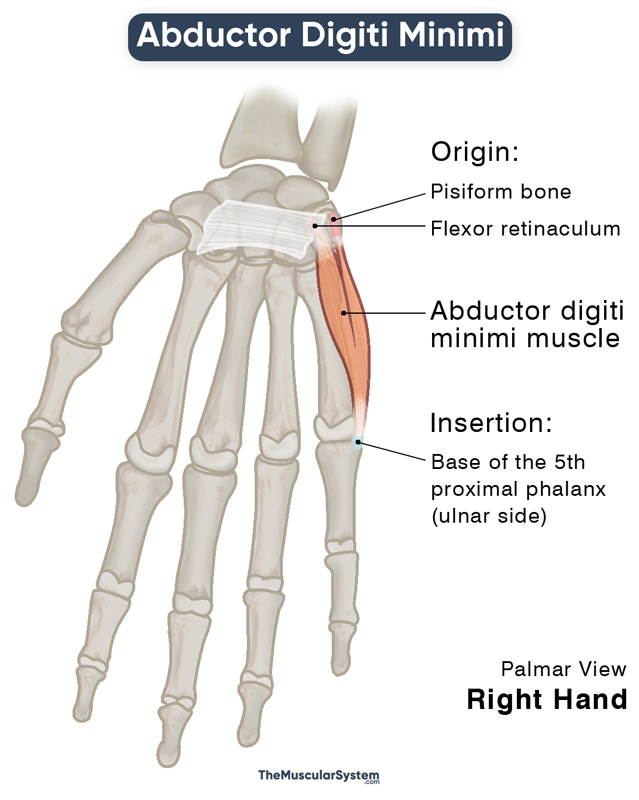Abductor Digiti Minimi of Hand
Last updated:
30/05/2023Della Barnes, an MS Anatomy graduate, blends medical research with accessible writing, simplifying complex anatomy for a better understanding and appreciation of human anatomy.
What is Abductor Digiti Minimi
The abductor digiti minimi (ADM) is a small intrinsic muscle of the hand that helps with the movements of the little finger. It is one of the hypothenar muscles, along with flexor digiti minimi brevis and opponens digiti minimi.
Anatomy
Location and Attachments
| Origin | Pisiform bone, pisohamate ligament, and flexor retinaculum |
| Insertion | The ulnar side of the 5th proximal phalangeal base |
Origin
The abductor digiti minimi is located along the palm’s ulnar or medial border at the little finger’s base. It is the most variable muscle of the 3 hypothenar muscles, with several variations observed in its origin and insertion.
The primary point of origin of the muscle is the pisiform bone. The ligament connection between the pisiform and the hamate called the pisohamate ligament, and between the pisiform and the metacarpals, called the pisometacarpal ligament, also serve as minor points of origin for the ADM.
A few muscle fibers may arise from the inserting tendon of the flexor carpi ulnaris, a superficial anterior forearm muscle that inserts into the hamate.
Insertion
The muscle belly courses distally from its origin and converges into a flat tendon that usually divides into 2 slips. One inserts into the medial side of the 5th proximal phalangeal base. The second one attaches to the ulnar border of the 5th digit’s aponeurosis and extensor expansion.
A variation in the insertion point may have the flat tendon inserted entirely into the 5th proximal phalangeal base.
Relations With Surrounding Muscles and Structures
It is the most medially located hypothenar muscle, lying along the ulnar side of the flexor digiti minimi brevis. The third muscle in the hypothenar group, the opponens digiti minimi, lies deep to the ADM.
Function
| Action | Abduction of the little finger at its metacarpophalangeal joint |
As its name suggests, its primary function is to abduct the little finger at the metacarpophalangeal joint. It means that contraction of the ADM causes the little finger to move away from the rest of the fingers. As a result, it allows you to grasp objects where the fingers need to be outspread, like holding a bowling ball.
Its attachment to the 5th extensor expansion allows it to act on the 5th interphalangeal joint and help flex the little finger.
Innervation
| Nerve | Deep branch of the ulnar nerve (C8, T1) |
Blood Supply
| Artery | Branches of the ulnar artery |
The blood supply comes from the deep palmar branch of the ulnar artery and the palmar digital artery. Branches of the superficial palmar arch, formed mainly by the ulnar artery, also vascularize the ADM of the hand.
The venous blood is drained into the deep veins of the upper limb via the palm’s venous network.
References
- Abductor Digiti Minimi: WheelessOnline.com
- Variation in Insertion of the Abductor Digiti Minimi: an Anatomic Study: PubMed.NCBI.NLM.NIH.gov
- Abductor Digiti Minimi Muscle of Hand: KenHub.com
- Abductor Digiti Minimi (Hand): Meddean.LUC.edu
- Abductor Digiti Minimi Muscle (Hand): RadioPaedia.org
- Abductor Digiti Minimi of Hand: IMAIOS.com
- Abductor Digiti Minimi (Hand): TeachMeAnatomy.info
Della Barnes, an MS Anatomy graduate, blends medical research with accessible writing, simplifying complex anatomy for a better understanding and appreciation of human anatomy.
- Latest Posts by Della Barnes, MS Anatomy
-
Tensor Tympani
- -
Stapedius
- -
Auricularis Posterior
- All Posts






